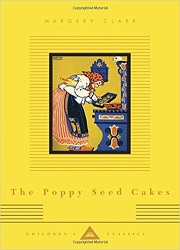
 The Poppy Seed Cakes
The Poppy Seed CakesReview posted June 1, 2018.
Everyman’s Library Children’s Classics, 2013. First published 1924. 157 pages.
Starred Review
Last year I wrote Project 52 – each week reflecting on one year of my life. Which brought back memories. And one of the memories was about which chapter books I read when I was still small, before we moved away from Seattle.
One of those first chapter books was The Poppy Seed Cakes.
I hadn’t read The Poppy Seed Cakes in years. But remembering it made me want to get a copy and hold it in my hands and read it over again. So I looked on Amazon and was delighted to find an Everyman’s Classics edition.
Once the book arrived, I read it immediately. All the pictures and page decorations are there! And I remember every single one and greet them all as old friends. There are many full-page illustrations, alternating between color and black and white. But there are also decorative patterns on each page, with each chapter having its own theme, and the pattern enclosing the text. For example, the chapter “The White Goat,” has a stylized picture of a goat parading across the top of the page. “Erminka and the Crate of Chickens” has chickens across the top, and “The Picnic Basket” has a goose reaching for a picnic basket.
The only thing wrong with this book is its bright yellow cover. I’m pretty sure my grandma’s copy was red. And that’s another thing. I’m not so sure any more that I did read this book from the library in Seattle. But I specifically remember reading it at my grandma’s house in Salem, Oregon – and I think maybe my great-grandmother had a copy as well. (However, that means my mother had read it as a child, so there’s a very good chance she did check it out for me from the library. Which would explain my memory of it as one of the first chapter books I got from the library.)
I am very sad I didn’t think of ordering this book when my own children were small, because I find it’s a book that begs to be read aloud. In fact, I’ll admit that I read some of it aloud even when sitting in my own home all alone. The phrase “Andrewshek’s Auntie Katushka,” which appears over and over just doesn’t want to remain silent in your head.
The stories are old-fashioned and quaint – but do stand the test of time. And the language! First we have stories about Andrewshek and Andrewshek’s Auntie Katushka. Andrewshek’s Auntie Katushka asks him to do something while she is gone – and Andrewshek consistently chooses to do something else – with varying results. Though they usually manage to deal with said results.
Then we have stories about Erminka and her red topped boots. They are her brother's, and they are too big, so wearing them gets Erminka in trouble more than once.
At the end of the book, the stories come together when Erminka comes for a tea-party at Andrewshek’s house. With poppy seed cakes.
All the animals can talk in this book. Each story is child-sized and matter of fact, and the animals are child-like in their responses. Here’s how the last story ends:
Andrewshek’s Auntie Katushka spread a clean white table cloth on the table under the apple tree in the garden. She brought out two plates of poppy seed cakes and five cups and saucers and five spoons and five napkins. Then she went back into the house to get some strawberry jam.
The white goat and the kitten and the dog and the two chickens came and sat down on the bench beside the table under the apple tree in the garden. They sat very quiet with their hands folded.
“If we behave nicely,” said the white goat, “perhaps Andrewshek’s Auntie Katushka will let us join the tea-party.”
Andrewshek’s Auntie Katushka came out on the porch with a bowl of strawberry jam in her hand. She saw the white goat and the kitten and the dog and the two chickens sitting quiet on the bench, with their hands folded.
“Well! Well!” said Auntie Katushka. “Some more friends have come to our tea-party. I hope they will like poppy seed cakes and strawberry jam, too.”
And they did.
Simple stories and simple concerns, with a happy ending. Though a modern child probably won’t hang out with geese and goats and chickens like Andrewshek and Erminka, they will understand how easy it is to be distracted, the lure of new boots, and the delight of eating poppy seed cakes.
